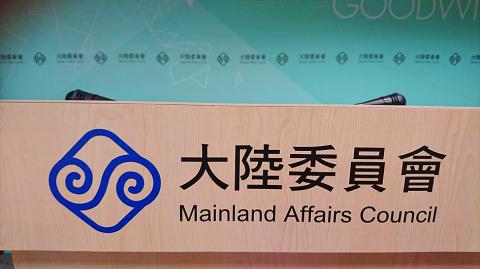The Mainland Affairs Council (MAC) said it is closely monitoring developments as China begins allowing Taiwanese to become elementary and junior-high school teachers, a role that entails pledging allegiance to the Chinese Communist Party (CCP) and carrying out the CCP’s ideological and political education.
Beijing has allowed Taiwanese who have obtained Chinese residency permits to apply for the teaching positions, with the application period ending on Friday.
China’s Taiwan Affairs Office spokesman Ma Xiaoguang (馬曉光) on Wednesday hailed the program as “another excellent policy realizing the equality of Taiwanese compatriots after the 31 measures announced last year.”

Photo: Chung Li-hua, Taipei Times
The policy is aimed at addressing the needs of Taiwanese studying in Chinese universities with the goal of becoming teachers, he said.
The application requirements include “supporting the CCP leadership, cleaving to the socialist direction of education and implementing all educational goals of the party.”
The educators would be required to attend “thought education” and sing the March of the Volunteers — the Chinese national anthem — as part of their job, sources said.
The council yesterday said that the Act Governing Relations Between the People of the Taiwan Area and the Mainland Area (台灣地區與大陸地區人民關係條例) forbids Taiwanese from joining the CCP or serving in the Chinese government or armed forces.
While the law does not specifically prohibit Taiwanese from teaching at elementary schools in China and the Ministry of Education has not determined the legal status of the academic program, the council said that Taiwanese employed by Chinese schools could still be in breach of the regulations under some circumstances.
As the application for such teaching positions included a political prerequisite, the council called on Taiwanese “to be aware of China’s political intent,” saying that Beijing is demanding that people make known their political stance under the guise of relaxing eligibility.
Chinese President Xi Jinping (習近平) in March last year said at the CCP National Congress and at the Chinese People’s Political Consultative Conference that the CCP should “augment patriotic education to pass on the ‘red DNA’ to the generations to come.”
The Chinese government has also been increasing its reliance on public schools as an instrument of political indoctrination, the New York Times reported in October 2017.
The Chinese Ministry of Education’s approved curriculum — including exercises in math classes — featured stories of revolutionary heroes, writings by Mao Zedong (毛澤東) and mythologized CCP history, such as the Long March, the newspaper said.
At the time, Beijing had established 231 model “Red Army” elementary schools, to which Xi and his mother had donated the equivalent of tens of thousands of US dollars, it said.
Although Ma touted the opening of the Chinese educational system to Taiwanese teachers as a beneficial measure, sources said that Chinese teachers are poorly paid.
While the salary for elementary and junior-high school teachers with a master’s degree in Taiwan is about NT$56,000 (US$1,816) per month, teachers in China with the same qualifications and job description are paid about 5,000 yuan (US$738), or 2,000 yuan in rural areas, the sources said.

US President Donald Trump yesterday announced sweeping "reciprocal tariffs" on US trading partners, including a 32 percent tax on goods from Taiwan that is set to take effect on Wednesday. At a Rose Garden event, Trump declared a 10 percent baseline tax on imports from all countries, with the White House saying it would take effect on Saturday. Countries with larger trade surpluses with the US would face higher duties beginning on Wednesday, including Taiwan (32 percent), China (34 percent), Japan (24 percent), South Korea (25 percent), Vietnam (46 percent) and Thailand (36 percent). Canada and Mexico, the two largest US trading

AIR SUPPORT: The Ministry of National Defense thanked the US for the delivery, adding that it was an indicator of the White House’s commitment to the Taiwan Relations Act Deputy Minister of National Defense Po Horng-huei (柏鴻輝) and Representative to the US Alexander Yui on Friday attended a delivery ceremony for the first of Taiwan’s long-awaited 66 F-16C/D Block 70 jets at a Lockheed Martin Corp factory in Greenville, South Carolina. “We are so proud to be the global home of the F-16 and to support Taiwan’s air defense capabilities,” US Representative William Timmons wrote on X, alongside a photograph of Taiwanese and US officials at the event. The F-16C/D Block 70 jets Taiwan ordered have the same capabilities as aircraft that had been upgraded to F-16Vs. The batch of Lockheed Martin

GRIDLOCK: The National Fire Agency’s Special Search and Rescue team is on standby to travel to the countries to help out with the rescue effort A powerful earthquake rocked Myanmar and neighboring Thailand yesterday, killing at least three people in Bangkok and burying dozens when a high-rise building under construction collapsed. Footage shared on social media from Myanmar’s second-largest city showed widespread destruction, raising fears that many were trapped under the rubble or killed. The magnitude 7.7 earthquake, with an epicenter near Mandalay in Myanmar, struck at midday and was followed by a strong magnitude 6.4 aftershock. The extent of death, injury and destruction — especially in Myanmar, which is embroiled in a civil war and where information is tightly controlled at the best of times —

China's military today said it began joint army, navy and rocket force exercises around Taiwan to "serve as a stern warning and powerful deterrent against Taiwanese independence," calling President William Lai (賴清德) a "parasite." The exercises come after Lai called Beijing a "foreign hostile force" last month. More than 10 Chinese military ships approached close to Taiwan's 24 nautical mile (44.4km) contiguous zone this morning and Taiwan sent its own warships to respond, two senior Taiwanese officials said. Taiwan has not yet detected any live fire by the Chinese military so far, one of the officials said. The drills took place after US Secretary